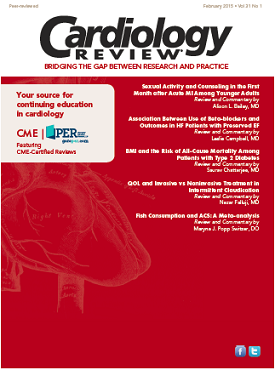Publication
Article
Shake Off the Winter Blues with Cardiology Review
Author(s):
Cardiology Review editor-in-chief Debabrata Mukherjee, MD, reviews the contents of this month's issue.

Debabrata Mukherjee, MD, MS, FACC
Editor-in-Chief
As ice and snow loosen their grip on most of the country, I hope we are ready to shake off the winter blues and enjoy spring. In line with the season for rejuvenation, renewal, resurrection, and regrowth, this particular issue of Cardiology Review discusses many important articles and viewpoints that I hope will rejuvenate our minds.
Dr Saurav Chatterjee discusses a U-shaped association of body mass index (BMI) with all-cause mortality among patients with type 2 diabetes and opines that there still remains a need to reevaluate the long-term effects of weight loss on mortality risk among patients with type 2 diabetes. Meanwhile, it would appear prudent that all persons with diabetes mellitus, regardless of weight status, be treated aggressively to mitigate health risks.
Dr Leslie Campbell reviews the association between the use of beta-blockers and outcomes in heart failure patients with preserved ejection fraction, and muses that evidence-based therapies for heart failure patients with preserved ejection fraction are shallow in number compared with the evidence for therapies in heart failure patients with reduced ejection fraction. Although there may be some common risk factors for these syndromes, there are also important differences in risk predictors. She further states that the available data imply that different treatment strategies may be needed for heart failure patients with preserved ejection fraction versus those with reduced ejection fraction
Dr Nezar Falluji discusses the best strategy for patients with moderate intermittent claudication and suggests that an early revascularization may be a better strategy in these patients. He points out the importance of incorporating quality of life, patient-centered, qualitative end points in assessing stable symptomatic medical conditions, where the patients’ perception of treatment effectiveness is as important as more objective measurable quantitative end points.
Dr Maryna Popp Switzer looks at the effects of fish consumption and acute coronary syndromes. She reports that fish consumption is beneficial, with multiple positive effects on cardiovascular health, including primary prevention of acute coronary syndromes. She further states that both men and women should aim for at least 2 servings of baked or broiled fish per week as part of their comprehensive health plan.
Dr Alison Bailey examines sexual activity and counseling in the first month after acute myocardial infarction among younger adults, and suggests that methods to improve the patient-physician discussion about sexual activity after heart attacks should be explored and current guidelines incorporated into sexual activity recommendations for our younger patients with heart attacks.
For our Clinical Forum section, Drs Eric Bates, Pareena Bilkoo, and Hitinder Gurm discuss the hot-button issue of multivessel versus culprit-vessel-only angioplasty in patients with acute myocardial infarction. I am sure you will enjoy their insightful comments. Overall, it would appear reasonable that physicians evaluate both clinical data and lesion complexity to determine the optimal strategy for angioplasty in a patient with multivessel coronary artery disease and myocardial infarction.
Finally, the insightful compilation of studies presented at Obesity Week by our excellent managing editor, Ms. Jackie Syrop should keep you updated on the latest happenings in the obesity and diabetes field. She also discusses several key items in the news, namely aspirin overuse for primary prevention, FDA approval of Savaysa, and the FDA’s approval of the Enroute Transcarotid Neuroprotection System for carotid stenting.
I hope that you will find these commentaries to be valuable and enjoyable. I encourage you to share your insights, thoughts, and personal experiences on the topics touched upon in this issue. On a broader level, I would love to hear feedback on how we can make this journal even better. My goal continues to be to make you look forward to every print and online issue of Cardiology Review.
Debabrata Mukherjee, MD
Editor-in-Chief






